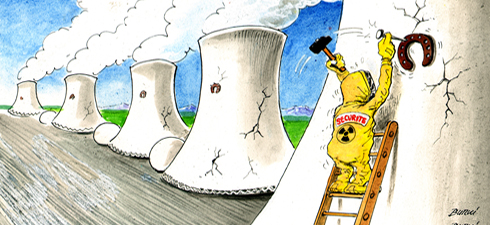Prime Minister Petr Nečas was correct when, during his trip to Germany last week, he asked whether the Czechs should continue to decide for themselves on nuclear power. By its very nature, the question stirs up a hornet's nest here in the Czech Republic. However, if one disregards the prejudice against “Brussels” and the spasmodic clutching at national "sovereignty" and looks at the issue rationally, the answer should be: No, we need not and should not have to decide ourselves.
Creating a single European office for nuclear safety is necessary for several reasons. Nuclear energy is not entirely a matter for individual states, as any accident would impact neighbouring countries. Second, the necessary confidence in national nuclear authorities is lacking. We see this in the Czech Republic, where nuclear power stations have become such an emotional issue that the head of the nuclear supervisory agency celebrates their opening, and what’s more, before they have even been approved.
Other reasons: establishing a single nuclear oversight agency is also logical because the split in opinions on nuclear energy is widening across Europe. In the long-term it is unsustainable that, given joint safety, financial, visa, antitrust and other kinds of policies, there exist risk sectors such as nuclear power that Member States have different views on, and yet that lie within the oversight solely of national officials. If the issue remained the anti-nuclear obsession of little Austria, it could all be considered a local affair.
Large electricity exporters have lower electricity prices
But when big Germany enters the fray, fear of nuclear energy blows up into a core feature of the EU itself. Such a spring of mutual distrust as huge as that regarding nuclear energy cannot simply be ignored. Europe’s nuclear supervisory agency should also not fall under political pressure – for example, that the Czechs should be able to produce enough power for export – and at the same time it should not let itself be corrupted by the energy megafirms.
Moreover, the transfer of responsibilities can win the approval of the nuclear energy sector itself. A stamp of approval from European authorities, which could include Germans, would be much less questionable than if, taking the Czech nuclear power sector as an example, permits were handed out within a small community in which everyone knows everyone else.
A look at Eurostat's tables confirms that post-communist states and large electricity exporters (France, Greece) have lower electricity prices. Czechs fall into both groups: we have cheap coal, nuclear power passed down from the communist era (i.e. based on Soviet technology), and we export almost all the output from Temelín – but the electricity isn’t cheap. Prices for the industry rank among the highest in the EU, already higher even than in Germany. Czech prices are therefore linked to German prices, but not in the way Nečas claims. Germany is building one of the most modern energy systems in the world. ČEZ (the Czech state utility) has reacted to its neighbour’s move merely by quietly adjusting its output prices, and has not yet even begun to seriously consider catching up.
Translated from the Czech by Anton Baer
Was this article useful? If so we are delighted!
It is freely available because we believe that the right to free and independent information is essential for democracy. But this right is not guaranteed forever, and independence comes at a cost. We need your support in order to continue publishing independent, multilingual news for all Europeans.
Discover our subscription offers and their exclusive benefits and become a member of our community now!












